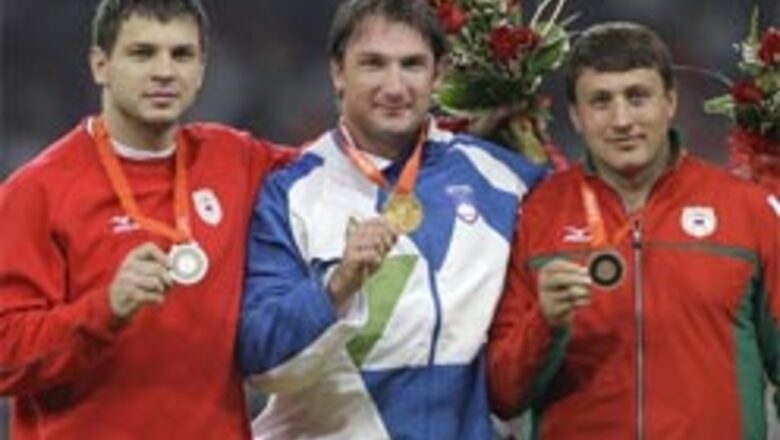
views
Lausanne: Two Belarusian hammer throwers were stripped on Thursday of their silver and bronze medals from the Beijing Olympics because of high levels of testosterone.
A Polish canoeist also was disqualified for drug use. The three cases bring to nine the number of athletes caught for doping in Beijing.
The International Olympic Committee Executive Board ruled against Vadim Devyatovskiy and Ivan Tsikhan, who tested positive for abnormal levels of testosterone after the hammer final on August 17 at the Bird's Nest Stadium.
In Minsk, Tsikhan and Belarusian Sports Minister Alexander Grigorov said they planned to appeal to the Court of Arbitration for Sport.
"This isn't a final verdict," Tsikhan said. "Without a doubt we will be appealing."
The IOC asked the International Association of Athletics Federations to officially modify the results and ordered the Belarus National Olympic Committee to return the medals.
The silver will go to Krisztian Pars of Hungary and the bronze to Koji Murofushi of Japan. Primoz Kozmus of Slovenia won the gold medal.
The IOC also imposed a lifetime Olympic ban on the 31-year-old Devyatovskiy because it was his second doping offence. He served a two-year drug suspension from 2000-02.
Under IAAF rules, Devyatovskiy faces a lifetime ban from the sport for two doping violations.
It was the first violation for 32-year-old Tsikhan, a three-time world champion and silver medalist at the 2004 Athens Olympics.
Tsikhan, however, faces a likely two-year ban from the IAAF. Under new IOC rules, any athlete suspended for six months or more for doping is banned from the next Olympics.
The Belarusians had denied drug use and appeared at a hearing before the IOC's disciplinary commission in Lausanne in September.
Once the medals are returned to the IOC, they will be sent to the Hungarian and Japanese Olympic committees to be awarded to Pars and Murofoshi.
Murofushi is benefitting for a second time from a rival's doping. Four years ago, he was upgraded to the gold medal in Athens after Adrian Annus of Hungary was stripped of first place.
Also on Thursday, the IOC disqualified Polish canoeist Adam Seroczynski, who tested positive for the steroid clenbuterol in Beijing after finishing fourth in the flatwater K2 event on August 22. His teammate, Mariusz Kujawski, was not implicated, but their team result was voided.
The IOC disqualified six athletes during the August 8-24 Olympics - Ukrainian heptathlete Lyudmila Blonska, Ukrainian weightlifter Igor Razoronov, Greek hurdler Fani Halkia, North Korean shooter Kim Jong Su, Spanish cyclist Isabel Moreno and Vietnamese gymnast Thi Ngan Thuong Do.
Blonska was stripped of her silver medal, while Kim had his silver and bronze medals revoked.
In addition, there were six doping cases involving horses in the equestrian competition in Beijing.
The IOC, meanwhile, has decided to retest 500 Beijing doping samples to look for previously undetectable drugs.
Starting in January, labs will begin analysing 400 samples for CERA, a new version of the blood-boosting hormone EPO, and 100 samples for insulin. The samples are mostly from endurance events such as cycling, rowing, swimming and track and field. The results will be known by the end of March.




















Comments
0 comment